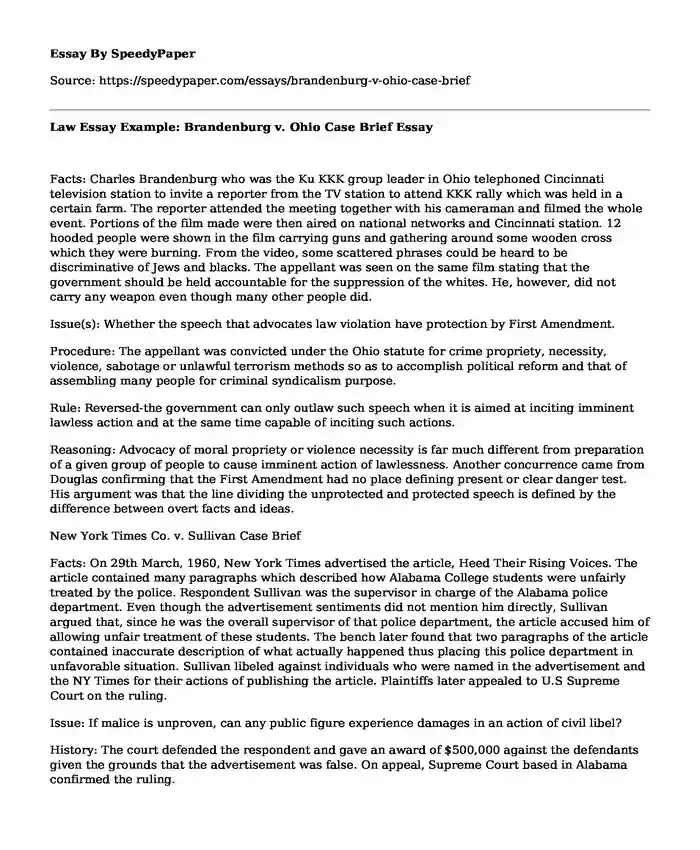Facts: Charles Brandenburg who was the Ku KKK group leader in Ohio telephoned Cincinnati television station to invite a reporter from the TV station to attend KKK rally which was held in a certain farm. The reporter attended the meeting together with his cameraman and filmed the whole event. Portions of the film made were then aired on national networks and Cincinnati station. 12 hooded people were shown in the film carrying guns and gathering around some wooden cross which they were burning. From the video, some scattered phrases could be heard to be discriminative of Jews and blacks. The appellant was seen on the same film stating that the government should be held accountable for the suppression of the whites. He, however, did not carry any weapon even though many other people did.
Issue(s): Whether the speech that advocates law violation have protection by First Amendment.
Procedure: The appellant was convicted under the Ohio statute for crime propriety, necessity, violence, sabotage or unlawful terrorism methods so as to accomplish political reform and that of assembling many people for criminal syndicalism purpose.
Rule: Reversed-the government can only outlaw such speech when it is aimed at inciting imminent lawless action and at the same time capable of inciting such actions.
Reasoning: Advocacy of moral propriety or violence necessity is far much different from preparation of a given group of people to cause imminent action of lawlessness. Another concurrence came from Douglas confirming that the First Amendment had no place defining present or clear danger test. His argument was that the line dividing the unprotected and protected speech is defined by the difference between overt facts and ideas.
New York Times Co. v. Sullivan Case Brief
Facts: On 29th March, 1960, New York Times advertised the article, Heed Their Rising Voices. The article contained many paragraphs which described how Alabama College students were unfairly treated by the police. Respondent Sullivan was the supervisor in charge of the Alabama police department. Even though the advertisement sentiments did not mention him directly, Sullivan argued that, since he was the overall supervisor of that police department, the article accused him of allowing unfair treatment of these students. The bench later found that two paragraphs of the article contained inaccurate description of what actually happened thus placing this police department in unfavorable situation. Sullivan libeled against individuals who were named in the advertisement and the NY Times for their actions of publishing the article. Plaintiffs later appealed to U.S Supreme Court on the ruling.
Issue: If malice is unproven, can any public figure experience damages in an action of civil libel?
History: The court defended the respondent and gave an award of $500,000 against the defendants given the grounds that the advertisement was false. On appeal, Supreme Court based in Alabama confirmed the ruling.
Ruling: No. The United States Supreme Court remanded the case and reversed the initial judgment.
Reasoning: the U.S Supreme Court ruled that the defendant was protected through fourteenth amendment. As such, public official should not recover damages due to defamatory falsehood that relates to his or her official conduct unless the statement is proven to be actual malice. The respondent gave no evidence showing that the petitioner was reckless and therefore had no malice proof. Therefore, in malice absence, the appellant could not be in a position to recover damages.
Cite this page
Law Essay Example: Brandenburg v. Ohio Case Brief. (2020, Apr 27). Retrieved from https://speedypaper.com/essays/brandenburg-v-ohio-case-brief
Request Removal
If you are the original author of this essay and no longer wish to have it published on the SpeedyPaper website, please click below to request its removal:
- America's Transition into a Super Power - Free Essay in American History
- Education Essay Sample: Users Motivation and the Effect of Incentives in Coursera
- Satirical Essay Example on Abortion
- Statutory Interpretation - Law Essay Example
- Environment in the News: Raising Doubts about Evolution in Science Class. Essay Sample.
- Essay Example about Satyam Computers' Accounting Fraud
- Essay Sample on Curbing Misinterpretation of Data
Popular categories





